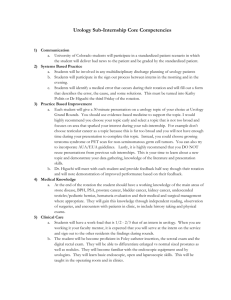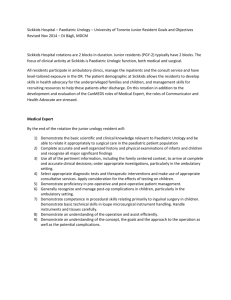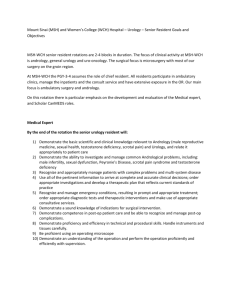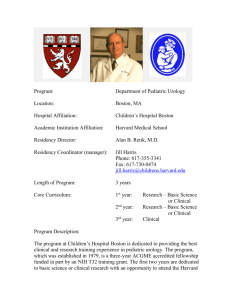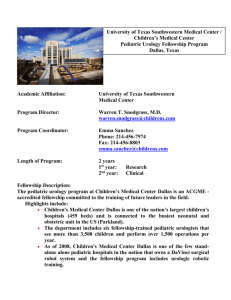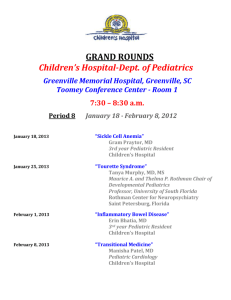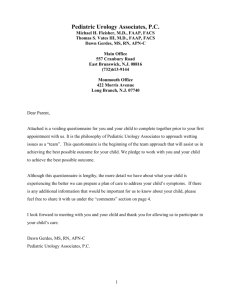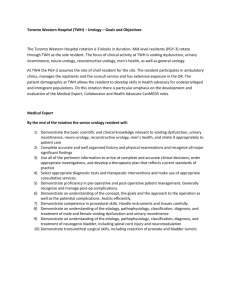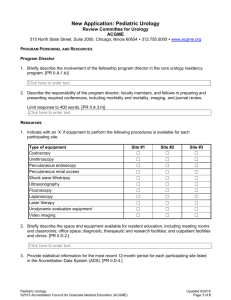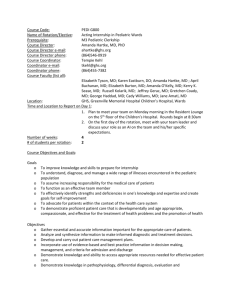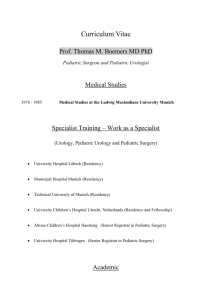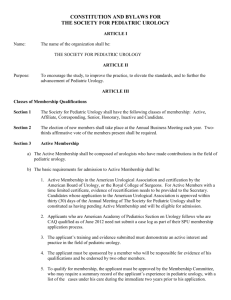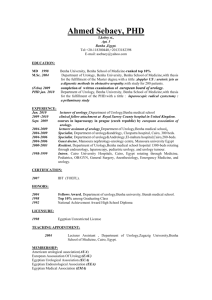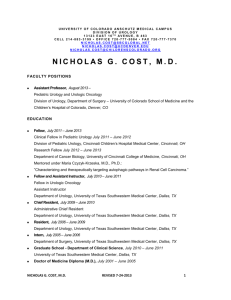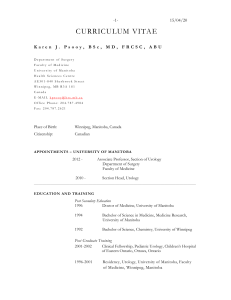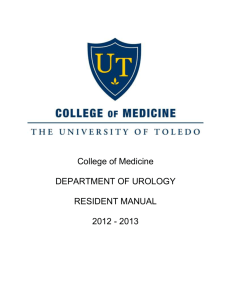Sickkids Senior Resident - Goals & Objectives - PGME
advertisement
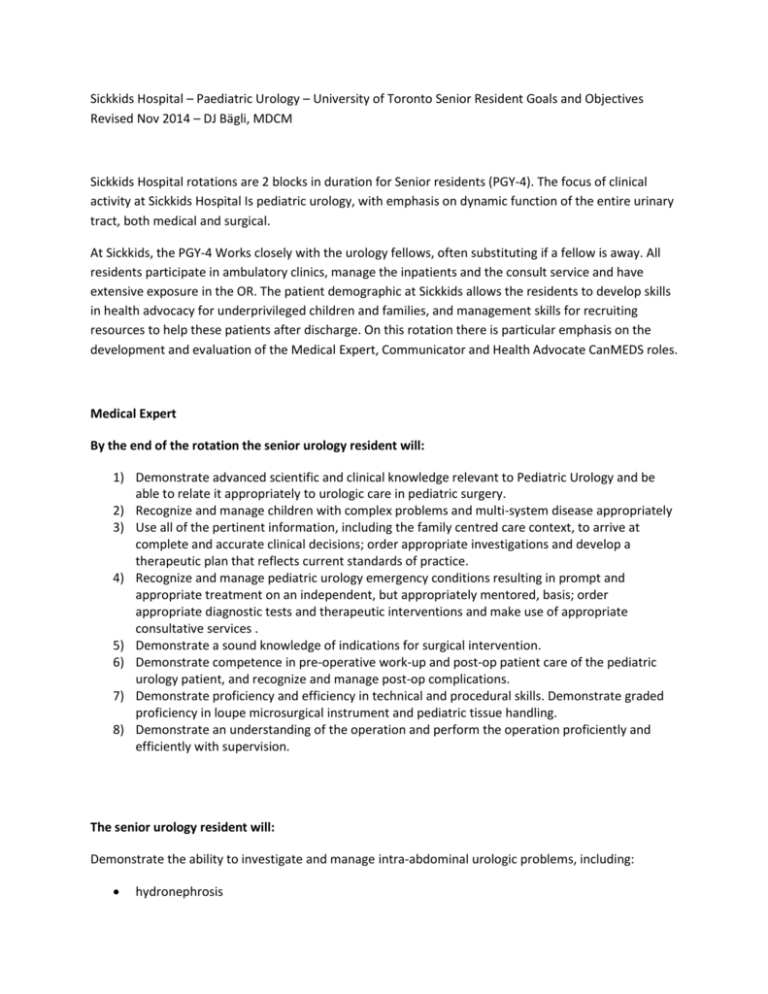
Sickkids Hospital – Paediatric Urology – University of Toronto Senior Resident Goals and Objectives Revised Nov 2014 – DJ Bägli, MDCM Sickkids Hospital rotations are 2 blocks in duration for Senior residents (PGY-4). The focus of clinical activity at Sickkids Hospital Is pediatric urology, with emphasis on dynamic function of the entire urinary tract, both medical and surgical. At Sickkids, the PGY-4 Works closely with the urology fellows, often substituting if a fellow is away. All residents participate in ambulatory clinics, manage the inpatients and the consult service and have extensive exposure in the OR. The patient demographic at Sickkids allows the residents to develop skills in health advocacy for underprivileged children and families, and management skills for recruiting resources to help these patients after discharge. On this rotation there is particular emphasis on the development and evaluation of the Medical Expert, Communicator and Health Advocate CanMEDS roles. Medical Expert By the end of the rotation the senior urology resident will: 1) Demonstrate advanced scientific and clinical knowledge relevant to Pediatric Urology and be able to relate it appropriately to urologic care in pediatric surgery. 2) Recognize and manage children with complex problems and multi-system disease appropriately 3) Use all of the pertinent information, including the family centred care context, to arrive at complete and accurate clinical decisions; order appropriate investigations and develop a therapeutic plan that reflects current standards of practice. 4) Recognize and manage pediatric urology emergency conditions resulting in prompt and appropriate treatment on an independent, but appropriately mentored, basis; order appropriate diagnostic tests and therapeutic interventions and make use of appropriate consultative services . 5) Demonstrate a sound knowledge of indications for surgical intervention. 6) Demonstrate competence in pre-operative work-up and post-op patient care of the pediatric urology patient, and recognize and manage post-op complications. 7) Demonstrate proficiency and efficiency in technical and procedural skills. Demonstrate graded proficiency in loupe microsurgical instrument and pediatric tissue handling. 8) Demonstrate an understanding of the operation and perform the operation proficiently and efficiently with supervision. The senior urology resident will: Demonstrate the ability to investigate and manage intra-abdominal urologic problems, including: hydronephrosis posterior urethral valves basic knowledge of pediatric renal transplantation and pediatric urologic oncology, as available more complex childhood urologic consults, involving multi-modality care strategies or advanced disease. Demonstrate fundamental skills, including: open pediatric renal and ureteral exposure being an assistant in hypospadias surgery being an assistant in pediatric laparoscopic urologic surgery and management of laparoscopic complications basic ability in endoscopic injection therapies for pediatric reflux or incontinence Communicator By the end of the rotation the senior urology resident will: 1) Exhibit effective and timely verbal and written communication skills including: communicating with children and families, verbal presentations, documentation and consult letters. 2) Establish a therapeutic relationship with children and their families, and communicate well with them. Provide clear and thorough explanations of diagnosis, investigations and management in a professional manner. Demonstrate empathy. 3) Provide children and families with sufficient information of the risks and benefits of treatment alternatives 4) Obtain informed consent from children and/or parents, providing sufficient information of the risks and benefits of the proposed procedure. 5) Write written orders, progress notes and consult notes are well organized and timely. Collaborator By the end of the rotation the senior urology resident will: 1) Participate effectively and appropriately in an inter-professional health care team. 2) Collaborate with community and child agencies (as required) as well as other health care professionals Manager By the end of the rotation the senior urology resident will: 1) Where appropriate, delegate and distribute tasks fairly; use time wisely. 2) Demonstrate management skills to reflect and balance priorities for patient care, sustainable practice and personal life. Health Advocate By the end of the rotation the senior urology resident will: 1) Support the health of children/families by providing appropriate referrals, support and information on health maintenance, as well as community/home resources. 2) Intervene on behalf of children and families or the community with respect to the social, economic and biologic factors that may impact on children’s’ health. Scholar By the end of the rotation the senior urology resident will: 1) Maintain and enhance professional activities through ongoing learning. 2) Critically evaluate medical information and its sources and apply this appropriately to pediatric urology practice. 3) Optional: Engage in academic projects with a view to presentation at national/international meetings and publication. Professional By the end of the rotation the senior urology resident will: 1) Demonstrate a commitment to excellence in clinical care and personal and ethical conduct. 2) Exhibit proper professional behavior. 3) Adhere to legal and ethical codes of practice.
